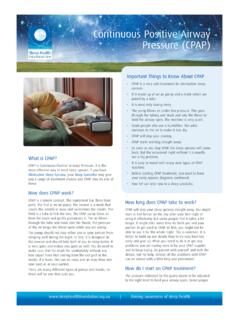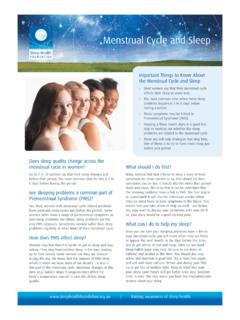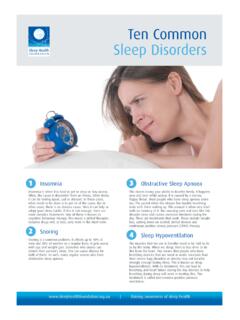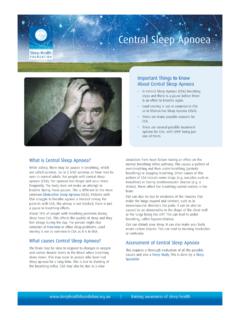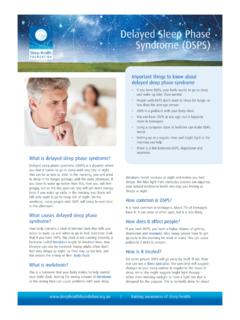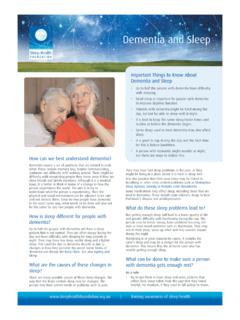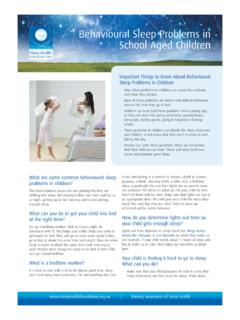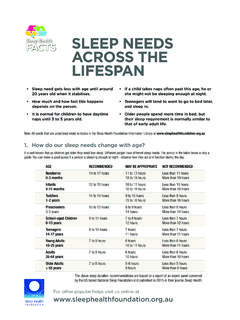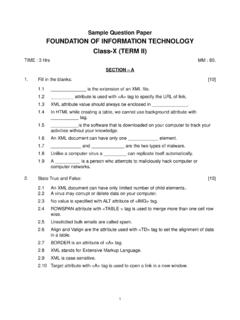Transcription of TECHNOLOGY AND SLEEP - About Us
1 TECHNOLOGY . AND SLEEP . TECHNOLOGY use in the evenings may delay bedtime and interfere with SLEEP Using a bright screen for hours or more can increase alertness. Not all people are affected by TECHNOLOGY use in the same way. Some forms of TECHNOLOGY use may be better than others and some activities better than others. In the evening, use TECHNOLOGY in moderation. Switch from interactive devices ( , phones) to passive devices ( , e-reader). Note: All words that are underlined relate to topics in the SLEEP Health foundation information Library at 1. How can TECHNOLOGY use affect 3. Does using TECHNOLOGY just us at bedtime? before bedtime affect SLEEP ? The bright screen light from devices can cause increased Self-reports suggest that SLEEP is indeed affected by TECHNOLOGY use in alertness the hour before bed. Such late-night TECHNOLOGY users report less Activities on such devices can be stimulating and make us less satisfactory SLEEP more often than those not using TECHNOLOGY before ready to SLEEP bed.
2 They are also more likely to feel sleepier during the day in a range of situations, including driving. These findings relate to both using a People can become absorbed and continue using TECHNOLOGY computer or laptop before bed or texting. The findings are from a 2011. beyond their usual bedtime US study that involved over 1500 people, surveyed by the US National SLEEP Foundation. 2. How long is too long to spend 4. Are some forms of TECHNOLOGY in front of a bright screen use more stimulating such that before bed? they affect SLEEP ? Studies have tested the effects of bright tablets ( ipads) and laptop Technological devices can be either interactive or passive. Passive screens for up to 5 hours before bed. It seems that the natural evening devices are those which need little to no input from the users. Examples rise in melatonin (a hormone that makes us ready for SLEEP ) is not include listening to music, reading an e-book, watching television or a affected by 1 hour of bright screen light, but it is after hours.
3 Thus movie. With interactive devices what is viewed on the screen changes after hours of TECHNOLOGY use in the evening people report feeling with input from the user. For example, playing a video game is clearly less sleepy. They also do better on mental performance tests and their interactive. To a lesser extent, so is surfing the web, messaging and brainwaves suggest increased alertness. Repeated use of a bright making posts on computers, laptops, tablets and smartphones. screen over 5 days can delay the body clock by hours. This means Researchers propose that interactive technological activities are more you consistently want to go to bed later and SLEEP in longer. This can be harmful for getting ready for SLEEP compared to passive activities. a real problem when you need to get up at a set time in the morning for school or work. For other popular helps visit us online at 5. Is everyone's SLEEP affected by 8. What About watching television TECHNOLOGY in the same way?
4 In the bedroom? No. Some people are more affected than others. Some young people, Many people enjoy reading a good book in bed, or listen to relaxing especially those who don't play lots of computer games, can be music or the radio before SLEEP . Those who report doing these passive sensitive to the effects of violent video games and this affects their activities in bed often have no trouble falling asleep, especially if the SLEEP . However, more experienced gamers may habituate to using lights are dim or off. So considering the television is classed as a TECHNOLOGY before bed and are less affected by violent video games. passive device, should it enter our bedrooms? Also, teenagers who are consider themselves to be less risk-takers are The answer is not clear. On the one hand, SLEEP experts talk About the more likely to stop gaming earlier and go to bed earlier than their benefits of keeping the bedroom as a sanctuary for SLEEP . They believe higher risk-taking peers.
5 Finally, those teenagers who strongly immerse that electronic devices in the bedroom can easily be a distraction from themselves in computer game activity (experiencing what is called a SLEEP . We know that unsupervised teenagers can easily watch TV in flow' state) play for longer and delay their bedtimes. Research is yet to their bedrooms till long past a healthy bedtime. On the other hand, we uncover all the different individual characteristics that explain why some currently have no evidence that watching a TV in the hour before bed in people are more affected by TECHNOLOGY use before bed than others. the bedroom brings on SLEEP problems. We do know, however, that relying on the TV being turned on while you 6. What About the effect of fall asleep can mean you lose the ability to self-soothe yourself to SLEEP and thus may have trouble falling back to SLEEP when awake in the TECHNOLOGY use on people's middle of the night. bedtimes? Data from over 85,000 teenagers (through an analysis of several 9.)
6 What strategies can help studies of teenage SLEEP ) showed that different forms of TECHNOLOGY use regulate my child's TECHNOLOGY ( , televisions, computers, phones and even video gaming) were related to later bedtimes. The more frequently adolescents used use? TECHNOLOGY in the evening, the later they went to bed. Using TECHNOLOGY Parents of a pre-teenaged child should try to restrict TECHNOLOGY use to often may increase alertness and/or reduce the ability to recognize after-school or earlier in the evening. Plan quiet activities (board games, sleepiness at night. Thus the teenagers keep playing, surfing, texting drawing, playing with toys, reading) closer to bedtime. This negotiation and chatting, resulting in delayed bedtime. is more difficult in the teenage years. Try to encourage interactive TECHNOLOGY use ( , video-gaming, smart phones) earlier in the 7. Can the alerting effects of evening, and use of passive technological devices ( , watching TV/movies, reading) in the lead up to bedtime.
7 A certain level of screens be reduced? accepting evening TECHNOLOGY use is needed. After all, it has been found Dim the screen as much as possible for evening use. In many that more than 90% of both teenagers and adults (13 to 64 years old). e-readers you can even invert the screen colour ( , white font on in the USA use TECHNOLOGY before bed. Practice what you preach. black background). A free software program for PCs and laptops decreases the amount of blue light (which affects melatonin levels) in 10. Where can I find out more? computer screens during the evening and increases orange tones instead. This program is called and is at 2011- TECHNOLOGY -and- SLEEP For information on over 60 different SLEEP related SLEEP Health Foundation topics, written by professionals, visit the SLEEP 114/30 Campbell Street, Blacktown NSW 2148. Health foundation information Library at T: +61 (0) 2 8814 8655 F: +61 (0) 2 9672 3884. The underlined topics in this article are covered in detail there.
8 This information is produced by: SLEEP Health Foundation SLEEP Disorders Australia Australasian SLEEP Association ABN 91 138 737 854 ABN 98 075 427 459 ABN 32 172 170 561. A national organisation devoted to education, advocacy A voluntary group offering assistance and support to The peak national association of clinicians and scientists and supporting research into SLEEP and its disorders. people and their families living with SLEEP disorders. devoted to investigation of SLEEP and its disorders. Disclaimer - information provided here is general in nature and should not be seen as a substitute for professional medical advice. SLEEP Health Foundation, 2016. Ongoing concerns About SLEEP or other medical conditions should be discussed with your local doctor. Version 1: April 2016.
